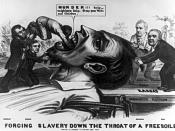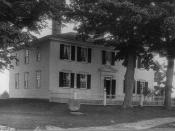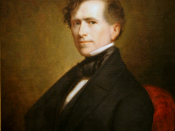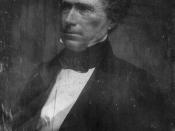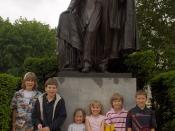Franklin Pierce, documented under the U.S Constitution as an American politician and as well as the fourteenth president of the United States, born in Hillsborough, New Hampshire, November 23 1804, assumed his presidency at a period of tranquility. However, his interest in politics led him to be elected to the House of Representatives, then he was appointed district attorney, and soon after, he enlisted for the Mexican war. This road led him to presidency, in which he accomplished changes beneficial to the U.S. Nonetheless, his honorable reputation slowly declined anticipating his decisions.
At the age of 11 he attended school at Hillsborough Center and moved to the Hancock Academy and in the spring of 1820, he was transferred to Francestown Academy. Soon after, then he was transferred to Phillips Exeter Academy to prepare for college. He entered Bowdoin College, in the fall of 1820, where he participated in literary, political, and debating clubs.
Thoughout his attendance at Bowdoin College, Pierce met writer Nathaniel Hawthorne and Henry Wadsworth Longfellow. , with whom he formed a friendship. When he joined the Athenian Society (student grouping with progressive political learning) he also met E. Stowe, Seargent S. Prentiss, and his future political rival, John P. Hale. Nevertheless, he graduated in 1824. Afterward he immersed himself to the study of law at a law school in Northampton, Massachusetts. Pierce, was admitted to the bar (a professional body of lawyers) in Hillsborough County. In 1829 Pierce was welected to the New Hampshire State legislature. After serving four-years in this office he was named Speaker of the House. At the age of 29 he was elected to the United States House of Representatives. After his marriage with Jean Means Appleton and the death of his two new born sons died and his son at the age of 11, Pierce resigned from the Senate in 1842 to practice law in Concord, New Hampshire. Soon after, President James Polk appointed him United States District Attorney in 1845. He enlisted in the Army as a private, at the outbreak of the Mexican War; he was commissioned as a Brigadier General. After Pierce resigned from the army, he was proposed by New Hampshire friends as a ÃÂdark horseÃÂ candidate on the 49th ballot at the 1852 Democratic National Convention.Nonetheless, two months before he took office, he and his wife saw their eleven-year-old son killed when their train was wrecked. Grief-stricken, Pierce entered the Presidency nervously exhausted.
As I mentioned before, Franklin Pierce assumed presidency at a time of relative tranquility and peace. The issue of slavery relaxed after the Compromise of 1850 but over time the issue suddenly resurfaced during his presidency but he did little to deal with it. However, Pierce attempted to promote unity by filling his cabinet with extremist from equally sides of the slavery argument. In addition, he tried to avoid the aggressive sectional antagonisms of the domestic act by ambitiously and aggressively encouraging the expansion of U.S. territorial and commercial interests abroad. He also managed to establish the Pierce Administration which reorganized the diplomatic and political service and created the United States Court of Claims. Moreover, Pierce's domestic policies were preparations for a transcontinental railroad and the opening of the Northwest for settlement. In 1853 he negotiated the purchase of almost 30,000 square miles of Mexican territory (the Gadsden Purchase), for $10 million. Pierce signed the Kansas-Nebraska Act in 1854, mainly to stimulate migration to the Northwest and to make possible the construction of a central route to the Pacific. In 1854 he signed the Kansas-Nebraska, which opened two new territories for settlement, included repeal of the Missouri Compromise of 1820 and provided that the status of the territories as ÃÂfreeÃÂ or ÃÂslaveÃÂ would be decided by popular authority. Although Franklin Pierce wasnÃÂt one of our greatest presidents he did manage to accomplish some beneficial improvements for the U.S.
"There's nothing left to do but get drunk" was a quote said by Pierce after he lost the democratic nomination. He almost ran over an elderly woman while driving a carriage and on top of that, his reputations in the North worsen when he declared support for the Confederacy. Though one of the friends he managed to cling by was Nathaniel Hawthorne but he had fallen so low that he was not asked to stand as a pallbearer at Hawthorne's funeral. However, his reputation was permanently ruined when his letters to Davis were published, in which he had written "the madness of northern abolitionism.ÃÂHe was considered according to an article in wikipedia, "never justify, sustain, or in any way or to any extent uphold this cruel, heartless, aimless unnecessary war", and that ÃÂhe true purpose of the war was to wipe out the states and destroy property.ÃÂ Even an abolitionist author named Harriet Beecher Stowe referred to him as "the archtraitor." Along with an article published on franklinpierce.org , it said, ÃÂPierce is ranked among the least effective Presidents as well as an indecisive politician who was easily influenced. He was unable to command as President and provides the needed National leadership.ÃÂ Pierce died, depressed and drunk yet again, of cirrhosis of the liver at the age of 64 on Oct. 8, 1869.
Franklin Pierce was criticized due to his dense decisions and for that reason he was considered one of the most unfavorable presidents in the U.S history. After he resurfaced the question of slavery expansion on the west, and when he came out in favor of the Kansas-Nebraska Act, and revoking the Missouri Compromise, hi popularity in the North decreased. In addition, his reputation was further damaged when the Ostend (a document published in the New York Herald which stated that if Spain was not willing to sell Cuba to the U.S., the United States would consider taking aggressive action to get it.) Manifesto was issued by several of his diplomats. Due to this I believe Pierce, is one of the lowest presidents of the U.S. Yet, I still believe he was a great statesman and an able lawyer, an orator of no mean reputation, and a brave soldier. He was a man of fine appearance and courtly manners, and he possessed personal magnetism and the ability to make friends, two qualities that contributed in great measure to his success.
In conclusion, Franklin Pierce arose as a great political figure but failed to maintain his reputation. As I mentioned before, what he managed to accomplish during he presidency was, buying a stretch of land now part of Arizona and New Mexico as part of the Gadsden Purchase. Additionally, in 1854, the Kansas-Nebraska Act he signed, allowed settlers in Kansas and Nebraska territories to decide for themselves whether slavery would be allowed. This is known as popular sovereignty. However, though, Franklin Pierce wasnÃÂt an admirable candidate for presidency, heÃÂs still admired by other who thinks otherwise. A quote said by Philip B. Kunhardt and Peter W. described their views on Pierce, "a good man who didn't understand his own shortcomings. He was genuinely religious, loved his wife and reshaped himself so that he could adapt to her ways and show her true affection. He was one of the most popular men in New Hampshire, polite and thoughtful, easy and good at the political game, charming and fine and handsome. However, he has been criticized as timid and unable to cope with a changing America."Bibliography:http://en.wikipedia.org/wiki/Franklin_Piercehttp://www.whitehouse.gov/about/presidents/FranklinPierce/http://millercenter.org/academic/americanpresident/piercehttp://www.franklinpierce.org/http://www.americanpresidents.org/presidents/president.asp?PresidentNumber=14
